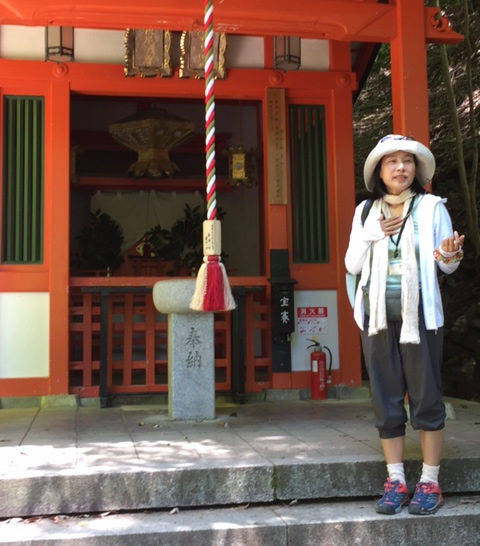
On our recent yoga retreat to Kyoto and the village of Kurama, our group of seventeen visited many shrines and temples. With each one, our wonderful guide, Chiharu, explained not only the history and significance of each sacred place, but she also unfolded the beliefs and concepts underlying the two religions of Japan: Shintoism and Buddhism.
At one point in our travels, as we stood before a Shinto shrine on the path up the mountain to the Kurama-dera mountain temple, Chiharu said, “Religion in the West is more about believing, religion in Japan is about respecting.” She, of course, was talking about “respect” in its deepest sense, something like “reverence,” “veneration,” even “love.”
I couldn’t help but wonder what it means to live one’s life with such an attitude of deep respect.
In Japan, we observed “respect” practiced in many forms: in how people always bowed to one another and to us; in how the meals were served with great care; in how the city streets were clean and without litter; how even the trash trucks were freshly painted and their fenders shiny; in how ancestors are honored and remembered. Respect was also apparent in attitudes toward nature: a reverence toward trees, some of which exceeded a thousand years in age, toward mountains, which are worship by some as links between earthly life and deities. In the deer park in Nara, I even witnessed a young man, probably of high school age, bowing reverently to the deer who approached him, deer who are considered sacred in this city.
It appeared to me that a deeper connection to and reverence toward nature and the seasons exists in Japanese culture than here in the West. I can’t help but wonder what it would be like if we held as a cultural value an attitude of reverence and caring toward the forests and waters, the mountains, the air, and wildlife. Would we not take care of, rather than polluting, the waters so they would be clean and pure; revere, rather than remove, our mountain tops, preserve, rather than destroy, forests and habitats for wildlife. I love the lines from Joy Harjo’s “Eagle Poem,” which, though she is Native American, seem to express the kind of reverence that I sensed in Kyoto.
We see you, see ourselves and know
That we must take the upmost care
And kindness in all things.
The concepts of “respect” and “reverence” are very much the underpinning of the teachings of yoga. What are referred to as the first two “limbs” of yoga recommend five ethical practices (yama) and five personal practices (niyama).
The five ethical practices are: non-violence, truthfulness, honesty, moderation, non-covetousness. The five personal practices are: cleanliness, contentment, a disciplined life aiming for mental and physical balance, self-study, devotion to a Higher Principle.
Each of the ethical practices implies living with respect toward all sentient beings and taking care not to cause harm, which are necessary in order to have a peaceful mind. Nicolai Bachman in his book the Path of the Yoga Sutras states: “Each yama is a guideline for behaving in a benevolent manner toward others so as to support the process of quietly turning inward and discovering our true nature (140). The respect we show through the practices of the yamas implies a respect and reverence toward ourselves since we each share the same inner light as all other beings.
Sometimes obstacles can limit our ability to live with the attitude of respect and care for ourselves that the niyamas imply. Many of us received teachings growing up that taught we should always put ourselves last to be a “good” person and that our most important goal should be serving others. I know for myself and many others with whom I have spoken that focusing on self-care or personal practices can raise feelings of guilt. Yet, if we do not take care of ourselves, how can we care for others? If we truly believe all beings, including ourselves, share a divine light, how can we ignore working to remove obstacles to our health, well-being, contentment, and peace of mind. How can we ignore caring for what is a temple for that light?
I am grateful for the guidelines for behaving and living that yoga’s yamas and niyamas provide. And, I am very grateful for the awareness raised by my time in Japan. Cultivating an attitude of respect and reverence “in all things” supports my commitment to practice the ethical and personal practices of yoga and deepens the peace and joy of living each day.
For your consideration: What might your life look like if you consciously lived with an attitude of respect and reverence in all you did each day?
Thank you, Elizabeth, for sharing your reflections on your experience in Japan and the ways it affirms the teachings and essence of yoga. This is inspirational and so helpful as I continue wrestling with the negative news that confronts us daily. Margee
I especially appreciate your observations on the similar tenets of Buddhist, Shinto and Native American beliefs. Thank you for bringing a glimpse of Japan back to us.
Elizabeth,
We have much to learn from the culture of Japan and the teachings of yoga.
Thank you for sharing your wisdom and recent travel experience.